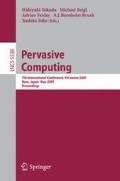Abstract
Although manual and programmable home thermostats can save energy when used properly, studies have shown that over 40% of U.S. homes may not use energy-saving temperature setbacks when homes are unoccupied. We propose a system for augmenting these thermostats using just-in-time heating and cooling based on travel-to-home distance obtained from location-aware mobile phones. Analyzing GPS travel data from 8 participants (8-12 weeks each) and heating and cooling characteristics from 5 homes, we report results of running computer simulations estimating potential energy savings from such a device. Using a GPS-enabled thermostat might lead to savings of as much as 7% for some households that do not regularly use the temperature setback afforded by manual and programmable thermostats. Significantly, these savings could be obtained without requiring any change in occupant behavior or comfort level, and the technology could be implemented affordably by exploiting the ubiquity of mobile phones. Additional savings may be possible with modest context-sensitive prompting. We report on design considerations identified during a pilot test of a fully-functional implementation of the system.
Access this chapter
Tax calculation will be finalised at checkout
Purchases are for personal use only
Preview
Unable to display preview. Download preview PDF.
References
CIA, The World Fact Book (cited 2008 08/15/2008), https://www.cia.gov/library/publications/the-world-factbook/
U.S. DOE Annual Energy Review (cited 2008 08/15/2008), http://www.eia.doe.gov/fuelelectric.html
U.S. DOE Building Energy Data Book (cited 2008 08/15/2008), http://buildingsdatabook.eren.doe.gov/docs/1.2.3.pdf
U.S. DOE Residential Energy Consumption Survey (cited 2008 08/15/2008), http://www.eia.doe.gov/emeu/recs/recs2005/hc2005_tables/detailed_tables2005.html
Nevius, J., Pigg, S.: Programmable Thermostats that Go Berserk? Taking a Social Perspective on Space Heating in Wisconsin. In: Proc. ACEEE Summer Study on Energy Efficiency in Buildings, vol. 8, pp. 233–244 (2000)
Plourde, A.: Programmable Thermostats as Means of Generating Energy Savings: Some Pros and Cons. Canadian Building Energy End-Use Data and Analysis Centre, Technical Report CBEEDAC 2003-RP-01 (2003)
Harris, C., Cahill, V.: Exploiting User Behaviour for Context-Aware Power Management. Proc. Wireless And Mobile Computing, Networking And Comm. 4, 122–130 (2005)
Ross, J.P., Meier, A.: Whole-House Measurements of Standby Power Consumption. In: Proc. 2nd Int’l Conf. on Energy Efficiency in Household App. and Lighting, vol. 108(13) (2000)
Roy, A., Bhaumik, S.K.D., Bhattacharya, A., Basu, K., Cook, D.J., Das, S.K.: Location Aware Resource Management in Smart Homes. In: Proc. IEEE Int’l Conf. on Pervasive Computing and Communications, pp. 481–488 (2003)
Harle, R.K., Hopper, A.: The Potential for Location-Aware Power Management. In: Int’l Conf on Ubiquitous Computing, pp. 302–311 (2008)
Thermostat History (cited 08/15/2008), http://www.prothermostats.com/history.php
Keyson, D.V., de Hoogh, M.P.A.J., Freudenthal, A., Vermeeren, A.P.O.S.: The Intelligent Thermostat: A Mixed-Initiative User Interface. In: Proc. Conf. on Human Factors in Computing Systems, pp. 59–60 (2000)
Fountain, M., Brager, G., Arens, E., Bauman, F., Benton, C.: Comfort Control for Short-Term Occupancy. Energy and Buildings 21, 1–3 (1994)
Mozer, M.C., Vidmar, L., Dodier, R.H.: The Neurothermostat, Predictive Optimal Control of Residental Heating Systems. In: Advances in Neural Information Processing Systems, vol. 9, pp. 953–959. MIT Press, Cambridge (1997)
Titus, E.: Advanced Retrofit: A Pilot Study in Maximum Residential Energy Efficiency. In: Proc. ACEEE Summer Study on Energy Efficiency in Buildings, vol. 1, pp. 239–245 (1996)
Fuji, H., Lutzenhiser, L.: Japanese Residential Air-Conditioning: Natural Cooling and Intelligent Systems. Energy and Buildings 18, 221–233 (1992)
Springer, D., Loisos, G., Rainer, L.: Non-Compressor Cooling Alternatives for Reducing Residential Peak Load. In: Proc. ACEEE Summer Study on Energy Efficiency in Buildings, vol. 1, pp. 319–330 (2000)
The Lawrence Berkeley National Laboratory. Thermostats and Comfort Controls (cited 2008 08/14/2008), http://comfortcontrols.lbl.gov/
Kempton, W.: Two Theories of Home Heat Control. Cog. Science 10, 75–90 (1986)
Gladhart, P., Weihl, J.: The Effects of Low Income Weatherization on Interior Temperature, Occupant Comfort and Household Management Behavior. In: Proc. ACEEE Summer Study on Energy Efficiency in Buildings, vol. 2, pp. 43–52 (1990)
Sachs, H.: Programmable Thermostats. American Council for an Energy Efficient Economy Technical Report (2004)
Analytics, R.: Validating the Impact of Programmable Thermostats: Final Report. RLW Analytics, Inc., Middletown, CT (2007)
Karjalainen, S., Koistinen, O.: User Problems with Individual Temperature Control in Offices. Building and Environment 42, 2880–2887 (2007)
Mozer, M.: The Neural Network House: An Environment that Adapts to its Inhabitants. In: Proc. AAAI Symposium on Intelligent Environments, pp. 110–114 (1998)
TrackStick (cited 2008 08/15/2008), http://www.trackstick.com/
LASCAR Logger (cited 2008 08/15/2008), http://www.lascarelectronics.com/
LOGiT Current and Voltage Data Logger (cited 2008 08/15/2008), http://www.supco.com/LOGiT%20Data%20Loggers.htm
U.S. Env. Protection Agency Energy Star Programmable Thermostats Specification (cited 2008 08/15/2008), www.energystar.gov/index.cfm?c=revisions.thermostats_spec
Mull, T.E.: HVAC Principles and Applications Manual. McGraw-Hill Professional, New York (1997)
MapQuest WebService (cited 2008 08/15/2008), http://developer.mapquest.com/
U.S. Census Bureau (cited 2008 08/15/2008), http://www.census.gov/
Yahoo Weather WebService (cited 2008 08/15/2008), http://weather.yahooapis.com/forecastrss?p=ZipCode
Residential Control Systems (cited 2008 08/15/2008), http://www.resconsys.com/products/stats/index.htm
Author information
Authors and Affiliations
Editor information
Editors and Affiliations
Rights and permissions
Copyright information
© 2009 Springer-Verlag Berlin Heidelberg
About this paper
Cite this paper
Gupta, M., Intille, S.S., Larson, K. (2009). Adding GPS-Control to Traditional Thermostats: An Exploration of Potential Energy Savings and Design Challenges. In: Tokuda, H., Beigl, M., Friday, A., Brush, A.J.B., Tobe, Y. (eds) Pervasive Computing. Pervasive 2009. Lecture Notes in Computer Science, vol 5538. Springer, Berlin, Heidelberg. https://doi.org/10.1007/978-3-642-01516-8_8
Download citation
DOI: https://doi.org/10.1007/978-3-642-01516-8_8
Publisher Name: Springer, Berlin, Heidelberg
Print ISBN: 978-3-642-01515-1
Online ISBN: 978-3-642-01516-8
eBook Packages: Computer ScienceComputer Science (R0)

